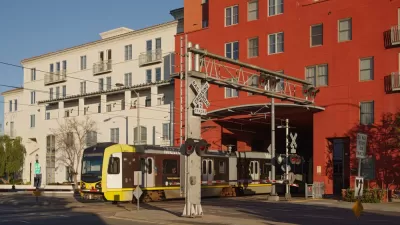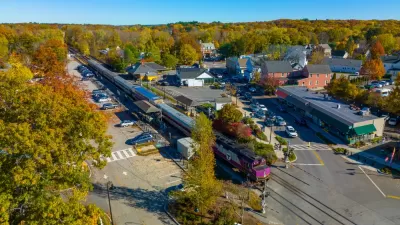A Massachusetts law aimed at reducing the state's housing shortage mandates zoning for multi-family housing in most eastern Massachusetts jurisdictions.

A Massachusetts state bill designed to boost housing production and increase density near transit will limit access to state grants for municipalities that don't comply with upzoning regulations, reports Henry Grabar.
The law mandates that communities zone for "as-of-right" multi-family apartment construction in formerly single-family neighborhoods in order to alleviate the state's housing shortage. As Grabar notes, "The mandate applies to places served by or adjacent to stations of the Massachusetts Bay Transportation Authority, the state agency that operates the buses and trains that fan out of Boston," with the biggest burden placed on "bedroom suburbs" that, despite having excellent transit, continue to limit housing production with exclusionary zoning that keeps housing costs high and supply low.
The new regulations require designated communities to zone or rezone at least one district to 15 homes per acre, compared to the current average of 6.2 homes per acre. Grabar points out that "That corresponds to a relatively dense but recognizably suburban fabric, such as town houses or duplexes around shared yards."
While state leaders hope a blanket policy will eliminate lengthy local hearing processes and reduce development costs, there are concerns about ways that resistant communities could circumvent or ignore the new law by adjusting zoning maps or imposing unreasonable restrictions.
FULL STORY: Can You Force the Suburbs to Build Apartments? Massachusetts Is Trying.

Planetizen Federal Action Tracker
A weekly monitor of how Trump’s orders and actions are impacting planners and planning in America.

San Francisco's School District Spent $105M To Build Affordable Housing for Teachers — And That's Just the Beginning
SFUSD joins a growing list of school districts using their land holdings to address housing affordability challenges faced by their own employees.

The Tiny, Adorable $7,000 Car Turning Japan Onto EVs
The single seat Mibot charges from a regular plug as quickly as an iPad, and is about half the price of an average EV.

Seattle's Plan for Adopting Driverless Cars
Equity, safety, accessibility and affordability are front of mind as the city prepares for robotaxis and other autonomous vehicles.

As Trump Phases Out FEMA, Is It Time to Flee the Floodplains?
With less federal funding available for disaster relief efforts, the need to relocate at-risk communities is more urgent than ever.

With Protected Lanes, 460% More People Commute by Bike
For those needing more ammo, more data proving what we already knew is here.
Urban Design for Planners 1: Software Tools
This six-course series explores essential urban design concepts using open source software and equips planners with the tools they need to participate fully in the urban design process.
Planning for Universal Design
Learn the tools for implementing Universal Design in planning regulations.
Smith Gee Studio
City of Charlotte
City of Camden Redevelopment Agency
City of Astoria
Transportation Research & Education Center (TREC) at Portland State University
US High Speed Rail Association
City of Camden Redevelopment Agency
Municipality of Princeton (NJ)





























